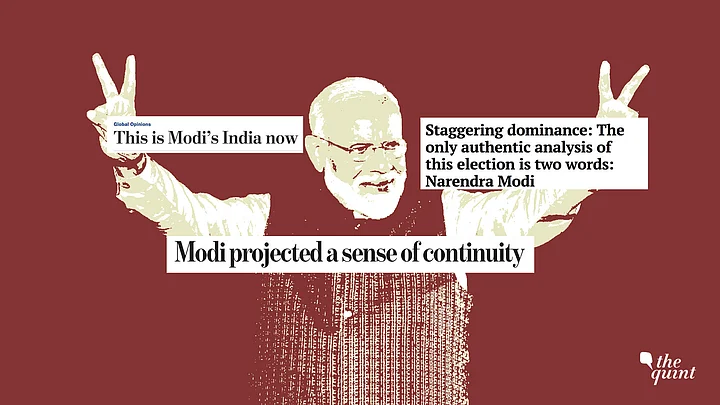With the Prime Minister Narendra Modi-led Bharatiya Janata Party securing a historic mandate in the 2019 Lok Sabha elections – more than 300 seats on its own and over 350 for the National Democratic Alliance – several political commentators have weighed in on the verdict with their insights.
How did the BJP secure an even larger mandate than it did in 2014? What about the anti-incumbency supposedly at play? What went wrong with the Congress-led Opposition in challenging the BJP? Here are some diverse perspectives from commentators in some of the leading publications on the result that was.
‘Don’t Blame RG; He Is Not Why Modi Has Crushed Congress’
In the opinion piece that appeared on NDTV as the trends became clear on Thursday, Mihir Swarup Sharma, a fellow at the Observer Research Foundation, propounds that the BJP’s “conception of Indian nationhood has fought and won a battle, over the past decade and more, against the Congress’ ‘Idea of India’.”
“The Congress has lost this election not because it failed to strike a few alliances, or because of the personality of Rahul Gandhi, or because it was poorer than the BJP and had fewer levers of influence. It lost because it has lost the ideological argument,” writes Sharma.
The piece also argues against Yogendra Yadav’s suggestion that the “Congress must die,” saying such a thing would amount to “choosing to kill this conception of the Indian nation.”
‘Staggering Dominance’
Pratap Bhanu Mehta starts his piece titled ‘Staggering Dominance’ in The Indian Express, declaring that “the only authentic analysis of this election is two words: Narendra Modi.”
“Many leaders win because the public does not see an alternative. Modi won because he made an alternative unthinkable,” he argues, as he also criticises the Opposition for its “pettiness and myopia,” showcased by their inability to come together.
With Modi’s resounding victory, Mehta also sounds a word of caution, saying it is “moment of dread for Indian democracy” with the “greatest concentration of power in modern Indian history.”
“… Let us be clear: Modi has not won because of his economic success; he has won despite his economic failures.”
‘Modi All The Way’
Political commentator Neerja Chowdhury’s piece in The Times of India, titled ‘Modi All The Way’, declares that the 2019 verdict was only “about Modi and his leadership,” with the contest being presidential in nature, where unemployment and agrarian distress could not become the centre of attention.
Apart from acknowledging the “growing Hinduisation of Indian society and polity,” the results also represent “the subalternisation of Indian politics,” Chowdhury notes.
“… Not only has Modi managed to turn the BJP’s vote base on its head in only five years, from being a Brahmin Bania party to one that stands for the interest of the poor, he has been accepted as the steward of their interests – be it as a chaiwala or a “chowkidar,” Chowdhury opines in the piece.
‘Modi Projected a Sense of Continuity’
Rajya Sabha MP Swapan Dasgupta, in his piece titled ‘Modi Projected a Sense of Continuity’ published in Hindustan Times, argues that many could not grasp the magnitude of PM Modi’s hold in the country, calling the leadership and focused direction of PM Modi as his two most important attributes.
While acknowledging that there was a “strong undercurrent of Hindu nationalism among BJP voters”, Dasgupta says “this was a passive element of the campaign.”
Like Chowdhury’s piece, Dasgupta makes a reference to the presidential style of election, saying:
“…What paid the party’s biggest dividend was its ability to convert a parliamentary election into a presidential one. This was a well-crafted approach which the Opposition understood but could only respond with platitudinous gibberish such as invoking the Idea of India. Modi invoked it far better and in a language people understood.”
‘This is Modi’s India Now’
Journalist Barkha Dutt, in her piece for The Washington Post, begins with the assertion that “India and her politics have been irrevocably altered”.
Noting the two historic mandates that have been given to Modi now – 2014 and 2019 – Dutt says that “it’s clear that his politics are much more than just a temporary disruption. And 2014 was not a black-swan moment; it was a preview.”
On the assumption that the Balakot airstrike decisively impacted the elections, Dutt calls it “too simplistic.”
“There is no doubt that the strike reinforced Modi’s reputation as a “mazboot” politician, or man of strength. But it was hardly the tipping point,” she says.
